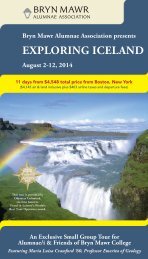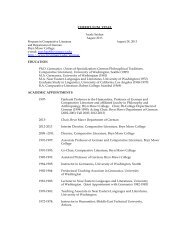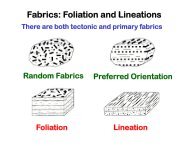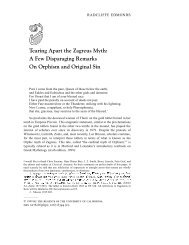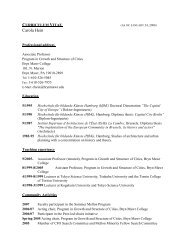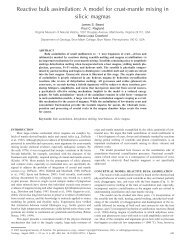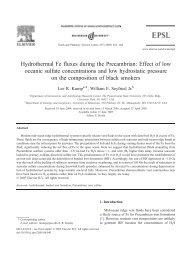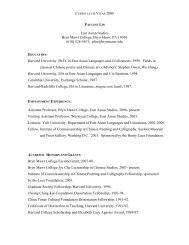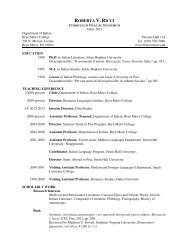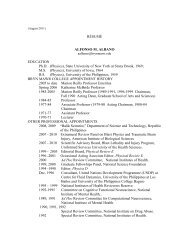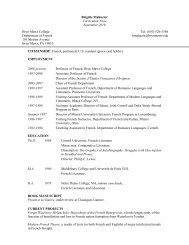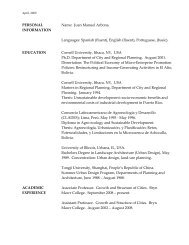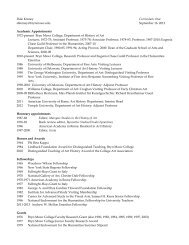Rediscovering Ying Qu and His Poetic Relationship to Tao Qian (clik ...
Rediscovering Ying Qu and His Poetic Relationship to Tao Qian (clik ...
Rediscovering Ying Qu and His Poetic Relationship to Tao Qian (clik ...
You also want an ePaper? Increase the reach of your titles
YUMPU automatically turns print PDFs into web optimized ePapers that Google loves.
<strong>Ying</strong> <strong>Qu</strong> <strong>and</strong> <strong>His</strong> <strong>Poetic</strong> <strong>Relationship</strong> <strong>to</strong> <strong>Tao</strong> <strong>Qian</strong> 55<br />
his cousins similarly reminds us of <strong>Tao</strong> <strong>Qian</strong>’s joy on receiv ing visiting<br />
friends.66<br />
The second section shifts back <strong>to</strong> the capital Luoyang, where <strong>Ying</strong><br />
<strong>Qu</strong> returned after the outing. Here, he describes his reclusive life back<br />
in the city <strong>and</strong> warns Miao <strong>and</strong> Zhou of the perils <strong>and</strong> hardships of a<br />
life of service. Not only is the contrast between service <strong>and</strong> reclusion<br />
reminiscent of <strong>Tao</strong> <strong>Qian</strong>’s habitual concerns; the images <strong>Ying</strong> Qi uses<br />
<strong>to</strong> describe the hermit’s life also echo <strong>Tao</strong> <strong>Qian</strong>’s images. For instance,<br />
<strong>Ying</strong> <strong>Qu</strong> notes, upon returning <strong>to</strong> the crowded city, that he “dwells in<br />
solitude; building [his] residence near the Luo River, feeling hemmed<br />
in by the noise <strong>and</strong> dust of the world.” Like <strong>Tao</strong> <strong>Qian</strong>, who describes<br />
the world of service as a “dusty net” (chenwang 塵 網 ), <strong>Ying</strong> <strong>Qu</strong> feels<br />
trapped by his world. Also like <strong>Tao</strong> <strong>Qian</strong>, who claims that “when the<br />
heart is distant, the place will naturally become remote” 心 遠 地 自 偏 ,67<br />
<strong>Ying</strong> <strong>Qu</strong> imagines a pure world on the Wen River, where he can transcend<br />
this dusty <strong>and</strong> clamorous world.68<br />
The <strong>to</strong>ne in <strong>Ying</strong> <strong>Qu</strong>’s letter <strong>to</strong> his cousins is intimate <strong>and</strong> confiding.<br />
Whereas <strong>Tao</strong> <strong>Qian</strong> claims that the reason for his retirement is that,<br />
by nature, he prefers a leisurely life, <strong>Ying</strong> <strong>Qu</strong> expresses his disappointments<br />
<strong>and</strong> his desire <strong>to</strong> retire. He voices sadness—<strong>and</strong> the frustrated<br />
feeling of ambition unachieved—when he speaks of his life in service.<br />
He observes that there are those who “even when they have become<br />
white-haired would still fail <strong>to</strong> meet someone who can appreciate them;<br />
they would merely be scurrying about in hunger <strong>and</strong> in cold.” Disillusioned,<br />
<strong>Ying</strong> <strong>Qu</strong> looks forward <strong>to</strong> retirement, where he can “clear up<br />
the fields, build houses,” <strong>and</strong> enjoy his friends’ visits.<br />
wine <strong>to</strong> accompany <strong>Ying</strong> <strong>Qu</strong>” 詠 詩 陪 賈 誼 , 酌 酒 伴 應 璩 . Yuding <strong>Qu</strong>an Tang shi, 296.4b;<br />
also preserved in Wenyuan yinghua 文 苑 英 華 , SKQS, 256.4b, <strong>and</strong> (Ming) Shicang lidai shixuan<br />
石 倉 歷 代 詩 選 , SKQS, 63.9b. In another fragment found in the Beitang shuchao 北 堂<br />
書 鈔 , <strong>Ying</strong> <strong>Qu</strong> writes “Ladling the spring wine. / I was able <strong>to</strong> serve the needs of my aging<br />
parents above, / And below provide warmth <strong>and</strong> nourishment for my wife <strong>and</strong> children”<br />
酌 彼 春 酒 , 上 得 供 養 親 老 , 下 得 溫 飽 妻 子 ; Lu Qinli, 1:473.<br />
66<br />
Lunyu zhengyi, 1.2a. This is a sentiment frequently echoed in <strong>Tao</strong> <strong>Qian</strong>’s poetry; see<br />
“Chou Ding Chaisang” 酬 丁 柴 桑 <strong>and</strong> “Da Pang canjun” 答 龐 參 軍 , in Lu Qinli, 2:972–73.<br />
On <strong>Tao</strong> <strong>Qian</strong>’s use of Lunyu, see Donald Holzman, “A Dialogue with the Ancients: <strong>Tao</strong><br />
<strong>Qian</strong>’s Interrogation of Confucius,” in Culture <strong>and</strong> Power in the Reconstitution of the Chinese<br />
Realm, 200–600, ed. Scott Pearce, Audrey Spiro, <strong>and</strong> Patricia Ebrey (Cambridge: Harvard<br />
University Asia Center, 2001), pp. 75–98.<br />
67<br />
Lu Qinli, 2:991.<br />
68<br />
Lu Qinli, 2:998.



